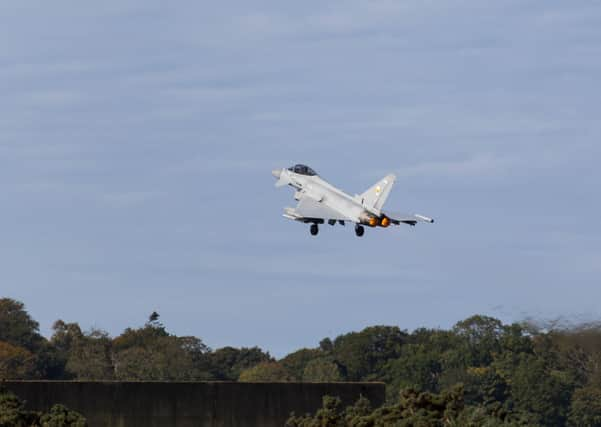Typhoons scrambled from Leuchars for third time in six days to intercept Russian aircraft


This time they intercepted Russian military aircraft operating over the North Sea near UK airspace.
The Typhoons, launched from Leuchars Station, where they are temporarily deployed while runway resurfacing takes place at RAF Lossiemouth.
Advertisement
Hide AdAdvertisement
Hide AdThey were assisted by an RAF Voyager from RAF Brize Norton which provided air to air refuelling for the Typhoons, and a NATO E-3A Sentry Airborne Early Warning aircraft that was re-tasked from a training mission nearby.
Two Russian Tu-142 Bear F Anti-Submarine Warfare and Maritime Patrol aircraft were intercepted. The RAF Typhoons monitored the Bears while in our area of interest to ensure the flight safety of all airspace users operating in this busy portion of international airspace. At no time did the Russian aircraft enter UK sovereign airspace.
Often these aircraft do not ‘squawk’ an identification code, which involves broadcasting the aircraft’s identity, intentions, position, and altitude. Likewise, they rarely talk to the variety of air traffic controllers that are responsible for airspace deconfliction, causing civilian airliners in the area to be re-routed to ensure flight safety.
To minimise the risks the RAF Typhoons shadowed the Russian Bears and closely monitored their movements, whilst reporting back to the Control and Reporting Centre at RAF Boulmer, as well as the NATO E-3A Sentry whose callsign was “Magic”.
Advertisement
Hide AdAdvertisement
Hide AdAir Officer Commanding 11 Group, Air Vice-Marshal Ian Duguid, said: “For the third time inside a week, the RAF has scrambled to defend the interests of the UK and NATO.
“It’s a sign of our continued resolve to work effectively with our NATO partners at all times and demonstrates the efficiency and resilience of our personnel, aircraft and systems.
“The whole process has its roots in the Battle of Britain system perfected by Air Chief Marshal, Lord Dowding in 1940. 80 years on, it remains as relevant as ever.”
Fast jets from several of the UK’s NATO allies also launched their Quick Reaction Alert assets to assist in monitoring the Russian Tu-142s. This included French, Danish, and Norwegian aircraft.
Comment Guidelines
National World encourages reader discussion on our stories. User feedback, insights and back-and-forth exchanges add a rich layer of context to reporting. Please review our Community Guidelines before commenting.